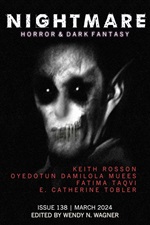“Second Deaths” by Keith Rosson
“A Guide to Camping in the Forest” by Oyedotun Damilola Muees
“Our Very Best Selves!” by Fatima Taqvi
Reviewed by C. D. Lewis
Nightmare Magazine offers dark fantasy and horror every month in both written and audio format. The March 2024 issue offers three new works of fantasy horror.
Keith Rosson‘s 5,000-word horror tale “Second Deaths” depicts a hopeless addict whose day job would ruin his body if his addiction hadn’t already, and whose bleak outlook reveals no hope for personal betterment. It should not surprise those familiar with despair that the main character gives thought, at points, to killing himself. Yet as the title intimates, death in this world isn’t the end to suffering: if one hasn’t had the right shots one can suffer a long time, killed just once … and nobody in this story seems to be able to afford the shots. Rosson depicts a dark, rotten world with terrible addictions and grisly new health problems sure to raise the stakes on expected real-world miseries. Dark discovery provides an awful conclusion. The piece does not so much deliver a climax as it shows a hopeless character stumble into quicksand. In a world like this, maybe acid quicksand.
Inspired by travels associated with a compulsory youth service program, Oyedotun Damilola Muees presents the flash fiction “A Guide to Camping in the Forest” as advice given in second person to an audience embarking on a trip through a forested wilderness. The advice isn’t about how to site a tent to avoid flooding during rain or how to avoid vermin in food stores, but a collection of admonitions and guidance to ensure one isn’t terrorized too badly or enslaved for eternity by local supernatural forces. The pièce de résistance is surely the instruction how to describe the place following one’s visit in order to retain the ability to return. Because that sounds like a blast, no?
Fatima Taqvi‘s fantasy “Our Very Best Selves!” is a self-improvement horror comedy spiced with body-horror and gender-based oppression. The narration reveals the protagonist as a passive passenger accepting with sad gratefulness the pathetic situation afforded her by her disinterested husband, to whom she feels grateful for repairing her wrecked body into something like a living zombie. She’s embarrassed by her slipping skin and falling-out eyeball, and accepts limitations because she feels she has little power and should be grateful for what she’s been given. But self-improvement in a fantasy world can take one much further than one might imagine, and the narrator acquires skills to improve her mind while she improves the repairs to her body—and her mind. Why didn’t her husband give better attention to the quality of her repairs? His loss … in more ways than one. A just-desserts table-turning resolution underscores the narrator’s arc into power. Recommended in particular to fans of dark comedy or revenge plots against dismissive misogynists.
 Nightmare
Nightmare